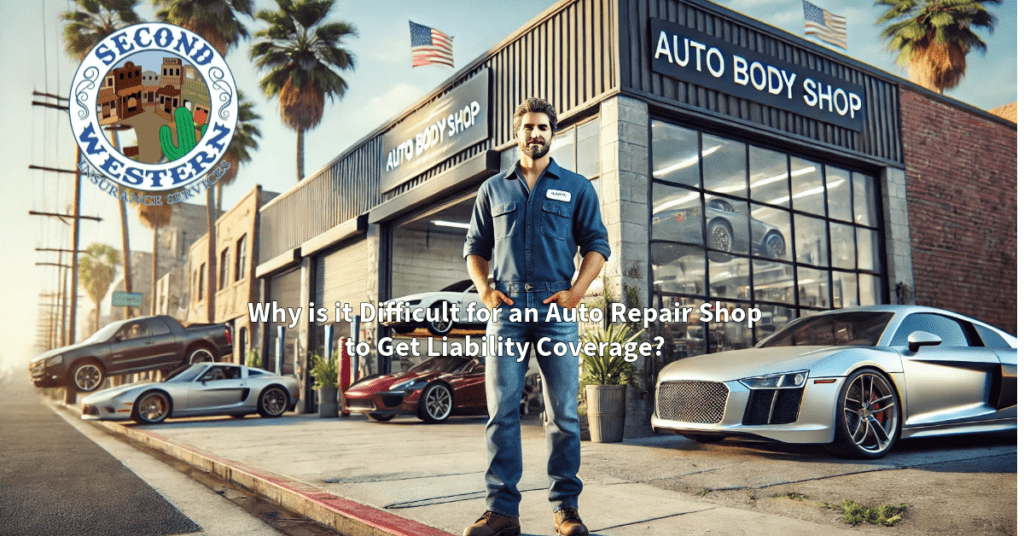Why is it Difficult for an Auto Repair Shop to Get Liability Coverage?
Miguel, who has run an auto repair shop in Pasadena for over a decade, recently noticed that renewing his liability insurance had become more complicated and costly. Each year, the process seemed to involve more hoops to jump through and higher premiums. As he connected with other shop owners in the area—including those in Glendale, Montrose, and Tujunga—he found they were experiencing similar challenges. But what exactly is driving this trend, and why is obtaining liability coverage becoming increasingly difficult for auto repair shops in Southern California?
Auto repair shops in Southern California, especially in areas like Pasadena, Glendale, and the Foothills region, are facing a tougher insurance market. Several factors are making it more challenging to secure the liability coverage these businesses need to protect themselves against property damage and bodily injury claims. In this post, we’ll explore these factors and offer some strategies for navigating the current insurance landscape.
The Factors Driving Up Insurance Costs for Auto Repair Shops

The insurance landscape for auto repair shops in Southern California has become more complex, with several key factors contributing to the difficulty in obtaining liability coverage. These factors include rising repair costs, an increase in liability claims, and changes in the auto insurance market that have directly impacted coverage availability and cost.
1. Rising Costs of Repairs
The Cost of Repairs for vehicles has been steadily increasing, particularly in Southern California. Modern vehicles, with their advanced electronics and materials, require specialized tools and expertise, leading to higher repair bills. For example, a minor collision involving a car equipped with advanced driver-assistance systems (ADAS) could result in repair costs that are significantly higher than those for older vehicles. As a result, insurance companies are facing higher claims costs, which leads them to raise insurance premiums or, in some cases, limit the coverage options they offer to auto repair shops.
Additionally, the rising cost of labor in Southern California, combined with the higher prices for auto parts due to supply chain disruptions, has further escalated the overall cost of vehicle repairs. These increased costs have a direct impact on the insurance rates that auto repair shops must pay to maintain adequate liability coverage.
2. Increased Frequency of Liability Claims
In recent years, the auto repair industry has seen a rise in liability claims related to property damage liability and bodily injury coverage. Whether due to a customer alleging improper repairs that led to an accident or injuries occurring on the premises, these claims are becoming more frequent. This trend is particularly pronounced in Southern California, where the high volume of vehicles and dense population contribute to a greater likelihood of accidents and subsequent claims.
Insurance companies are responding by tightening their underwriting standards, making it harder for repair shops to obtain or renew liability coverage. For instance, some insurers may require auto repair shops to implement stricter safety protocols or demonstrate a proven track record of minimizing claims before they are willing to provide coverage. This increased scrutiny can be a significant hurdle for shop owners, particularly those who may have experienced claims in the past.
3. Evolving Auto Insurance Market
The auto insurance market in Southern California is particularly competitive and volatile. Changes in auto insurance policies, collision insurance, and liability limits are making it harder for repair shops to find adequate liability insurance. The auto insurance industry is also facing pressure from regulatory changes and increased litigation, which have led to higher insurance premiums and more restrictive coverage limits.
Furthermore, the entry of new technologies and the growing complexity of vehicles have created additional challenges for auto repair shops. As cars become more technologically advanced, the potential for costly mistakes in repairs increases, leading to a higher likelihood of fault accidents and subsequent liability claims. This has caused some auto insurance companies to re-evaluate their risk exposure and, in some cases, withdraw from certain markets or limit the types of businesses they cover.
The Impact on Auto Repair Shops in Southern California
For auto repair shops in Southern California, including those in Pasadena, Glendale, Montrose, and the Foothills region, these challenges translate into increased operational costs and a greater risk of being underinsured.
1. Higher Insurance Premiums
One of the most immediate impacts is the increase in insurance premiums. As auto insurance companies face higher claims costs and a more litigious environment, they pass these costs onto repair shop owners. This not only strains the shop’s budget but also makes it harder to stay competitive in a crowded market. For smaller shops or those operating on thin margins, the rising cost of insurance can be particularly burdensome, forcing them to make difficult decisions about the level of coverage they can afford.
In addition to higher premiums, auto repair shops may also face increased deductibles or reduced coverage limits as insurers seek to mitigate their own risk. This can leave shops exposed to greater financial risk in the event of a major claim.
2. Stricter Underwriting Standards
With the rise in liability claims, insurance companies are becoming more selective about the businesses they cover. Shops may face stricter requirements, such as demonstrating robust risk management practices, maintaining comprehensive records, and even accepting higher deductibles or lower coverage limits. For example, insurers may require shops to provide detailed documentation of their repair processes, employee training programs, and safety protocols as part of the underwriting process.
These stricter standards can be particularly challenging for newer shops or those with a history of claims, as they may struggle to meet the heightened requirements. In some cases, shops may find that they are unable to obtain coverage at all, leaving them vulnerable to potential lawsuits and financial losses.
3. Limited Coverage Options
Some insurance providers are pulling out of the market altogether, leaving fewer options for auto repair shops. This lack of competition can further drive up premium costs and limit the ability of shop owners to find the liability auto insurance they need. In some cases, shops may be forced to work with smaller or less-established insurers, which can introduce additional risks and uncertainties.
The reduction in available coverage options also means that shop owners may need to spend more time and effort shopping for insurance, comparing policies, and negotiating terms. This can be a time-consuming and frustrating process, particularly for busy shop owners who are already juggling the demands of running their business.
Strategies for Securing Liability Coverage
Despite these challenges, there are steps that auto repair shops in Southern California can take to improve their chances of obtaining the liability coverage they need.
1. Enhance Risk Management Practices
Insurance companies are more likely to offer coverage to shops that demonstrate strong risk management. This includes regular employee training, maintaining a safe and organized workspace, and ensuring that all repairs are performed to the highest standards. By reducing the likelihood of fault accidents and liability claims, shops can make themselves more attractive to insurers.
For example, implementing a comprehensive safety program that includes regular inspections of equipment, clear protocols for handling hazardous materials, and ongoing employee education can help reduce the risk of accidents and claims. Additionally, shops can consider investing in technology that enhances safety, such as surveillance cameras or automated diagnostic tools that minimize the potential for human error.
2. Work with an Experienced Insurance Agent
Navigating the complexities of the insurance industry can be challenging, especially with the shifting landscape in Southern California. Working with an experienced insurance agent who understands the unique needs of the auto repair industry can help shops find the best coverage options. An agent can negotiate with insurance companies on your behalf, ensuring you get the coverage you need at a price you can afford.
An experienced agent can also provide valuable guidance on how to meet the stricter underwriting standards that many insurers are now imposing. By working closely with an agent, shop owners can ensure that they have the right documentation, safety protocols, and risk management practices in place to secure the coverage they need.
Navigating the Insurance Landscape in Southern California
For auto repair shops in Southern California, particularly those in areas like Pasadena, Glendale, and the Foothills region, securing adequate liability coverage is becoming increasingly difficult. However, by understanding the factors driving these changes and taking proactive steps to mitigate risks, shop owners can still protect their businesses.
At Second Western Insurance, we specialize in helping auto repair shops throughout Southern California navigate the complex and changing insurance market. Whether you’re struggling to find affordable liability coverage or need advice on how to improve your shop’s risk profile, our team is here to help. Contact us today to learn more about how we can support your business with comprehensive insurance solutions tailored to your needs.
Second Western Insurance, an independent insurance agency, serves LA County, including Pasadena, Flint Ridge, Montrose, Glendale, Tujunga, and the Foothills region. Our independent insurance agents understand the unique risks auto body shops face and can help you find the best coverage options. Contact Second Western Insurance today to learn more about how they can help protect your business and provide peace of mind.
